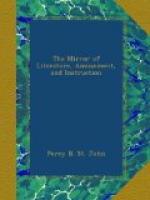BY L.E.L.
The wind is sweeping o’er the hill;
It hath a mournful sound,
As if it felt the difference
Its weary wing hath found.
A little while that wandering wind
Swept over leaf and flower;
For there was green for every tree,
And bloom for every hour.
It wandered through the pleasant wood,
And caught the dove’s lone song;
And by the garden-beds, and bore
The rose’s breath along.
But hoarse and sullenly it sweeps;
No rose is opening now—
No music, for the wood-dove’s nest
Is vacant on the bough.
Oh, human heart and wandering wind,
Go look upon the past;
The likeness is the same with each—
Their summer did not last.
Each mourns above the things it loved—
One o’er a flower and leaf;
The other over hopes and joys,
Whose beauty was as brief.
We congratulate the editor and the public on the past success of the Amulet, especially as it proves that a pious feeling co-exists with a taste for refined amusement, and that advantageously. There is nothing austere in any page of the Amulet, nor anything so frivolous and light as to be objectionable; but it steers in the medium, and consequently must be acceptable to every well-regulated mind. Indeed, many of the pieces in the present volume may be read and re-read with increased advantage; whilst two only are unequal to the names attached to them.
* * * * *
THE GEM.
Edited by Thomas Hood, Esq.
The present is the first year of the Gem, which, as a work of art or literature, fully comes within the import of its title. It is likewise the first appearance of Mr. Hood as the editor of an “annual,” who, with becoming diffidence, appears to rely on the “literary giants” of his muster-roll, rather than on his individual talent. Notwithstanding such an editorship must have resembled the perplexity of Sinbad in the Valley of Diamonds, Mr. Hood’s volume is almost unexceptionably good, whatever he may have rejected; and one of the best, if not the best, article in the whole work, has been contributed by the editor himself. Associated as Mr. Hood’s name is with “whim and oddity,” we, however, looked for more quips, quirks, and quiddities than he has given us, which we should have hailed as specially suited to the approaching festive season, and from their contrast with the contents of similar works, as more likely to attract by their novelty and humour.




